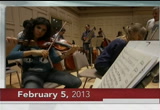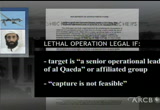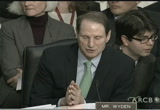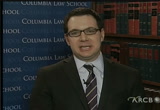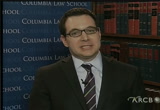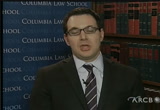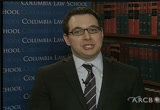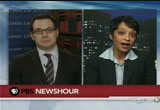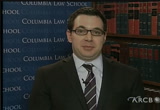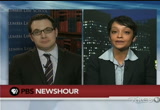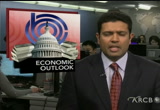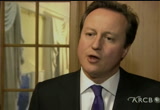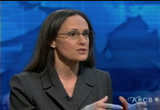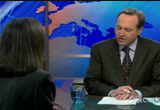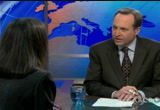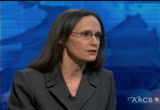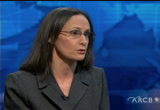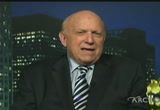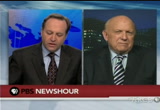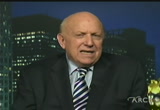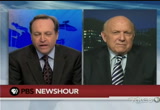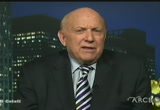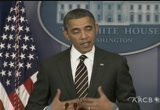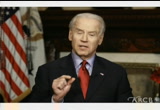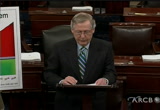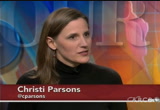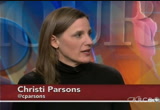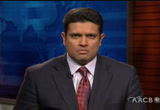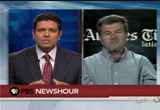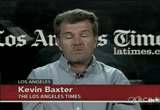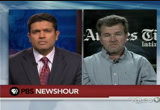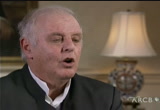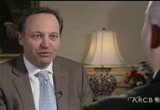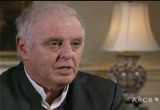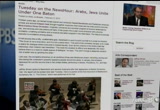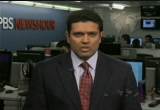tv PBS News Hour KRCB February 5, 2013 5:30pm-6:30pm PST
5:32 pm
captioning sponsored by macneil/lehrer productions >> ifill: the department of justice, in a previously secret memo, justifies killing american citizens on foreign soil if they have high-level ties to al qaeda. good evening. i'm gwen ifill. >> brown: and i'm jeffrey brown. on the newshour tonight, we explore the legal and other issues surrounding the u.s. policy. >> ifill: then, federal and state governments sue a credit ratings agency it says gave good ratings to bad mortgage investments. >> brown: ray suarez looks at president obama's use of campaign-style events to push his legislative agenda. >> ifill: hari sreenivsan examines a million-dollar match fixing scandal shaking the world of international soccer. >> brown: and playing with the enemy: we have the story of an orchestra of israelis and arabs coming together for music, and maybe more. >> the only way that we can achieve anything that is remotely related to peace is if
5:33 pm
we sit together and talk or if we at least try to. >> ifill: that's all ahead on tonight's newshour. >> major funding for the pbs newshour has been provided by: >> sailing through the heart of historic landscapes you see things differently. you get close to iconic landmarks, to local life, to cultural treasures. it's a feeling that only the river can give you. these are journeys that change your perspective on the world and perhaps even yourself. viking river cruises. exploring the world in comfort. >> bnsf railway. >> and by the bill and melinda gates foundation. dedicated to the idea that all people deserve the chance to live a healthy, productive life. >> and with the ongoing support
5:34 pm
of these institutions and foundations. and... >> this program was made possible by the corporation for public broadcasting. and by contributions to your pbs station from viewers like you. thank you. >> ifill: a leaked document today put the spotlight back on lethal strikes by the u.s. government on u.s. citizens abroad. in response, top officials in the obama administration argued their actions are justified and legal. >> primary concern is to keep the american people safe, now do so in a way that's consistent with our laws and our values. >> ifill: attorney general eric holder today defended the justice department's rationale for authorizing the killings of americans overseas. >> we are -- we have as a basis
5:35 pm
for action that we take a congressional statute that allows us to operate against al qaeda and associated entities not only in pakistan or not only in afghanistan but in other parts of the world. we say that we only take these kinds of actions when there's an imminent threat, when capture is not feasible and when we are confident that we're doing so in a they's consistent with a federal international law. >> ifill: nbc news obtained a 16-page justice department white paper apparently prepared for congressional committees last summer that describes the obama administration's legal reasoning the document said a lethal operation is legal if it targets a senior operational leader of al qaeda or an affiliated group. if their capture is not feasible and if an informed high level official of the u.s. government determines the target poses an imminent threat of violent
5:36 pm
attacks against the united ate. the white paper describes such killings as a lawful act of national self-defense and not an illegal assassination. the issue first surfaced in september, 2011, when president obama announced the killing of american-born al qaeda leader anwar al-awlaki. he was the target of a u.s. drone strike in yemen. >> the death of al-awlaki is a major blow to al qaeda's most active operational affiliates. he took the lead in planning and directing effortings to murder innocent americans. >> reporter: u.s. officials say al-awlaki inspired the fort hood shooter in 2009 and the failed bombing of a detroit airliner that christmas among other attempted attacks. three other americans, including al-awlaki's 16-year-old son, have also been killed by u.s. drone strikes in yemen. civil liberties groups have said such attacks deprive u.s.
5:37 pm
citizens of constitutional due process protection. but white house press s.e.c. jay carney justified those actions today as legal, ethical, and wise. >> the questions around this issue are important and the president takes them seriously. we have significant challenges because of the nature of the attacks, how they're planned, who plans them. but there is no question that senior operational leaders of al qaeda are continually planning to attack the united states, to attack american citizens. the authorization to use military force is entirely appropriate for the united states to target seen yore operatial leaders of al qaeda. >> ifill: the white paper-- revealed overnight-- was drawn from more detailed legal memo which is remains classified. a bipartisan group of senators led by oregon's ron widen have asked they be made public in advance of thursday's hearing on the nomination of john brennan
5:38 pm
to be c.i.a. director. brennan has been key in implementing the stepped-up use of drones to target terror suspects. >> ifill: for more now on the justice department's white paper, we get two views. mattw waan is a profesr of w at lumbia lawchool and a fellow at the council on foreign relations. and hina shamsi is director of the american civil liberties union's national security project. hina shamsi, has you look at this white paper today did it tell you something you did not know or that maybe you snerd. >> well, the argument in the white paper is quite familiar in many ways to speeches that senior administration officials have given. but i think there are two aspects that are particularly problematic and deeply chilling and everyone should read this white paper. someone what itays or summarizes abt the substante legal standards that the government is apparently applying. it starts out claiming that there are limits, for example, imminent threats, as you quoted in your introduction.
5:39 pm
as you keep reading as it turns out for a high-level official to determine that a threat is imminent he or she doesn't need clear evidence, there doesn't need to be a specific plot and there doesn't need to be any indication that the person is near or on a battlefield. so what you have is imminence defined out of its plain meaning and what appear like striions a no restrictions at all. you can see how it's easy to manipulate. >> ifill: matthew waxman, are these standards you see laid out in this white paper open to manipulation? >> well, i had a different reaction than ms. shamsi did this document. as i read it, i see it as a careful and narrow. i still have some questions about it. it's a summary document and there are parts of it the leave some gaps in my mind as to how the reasoning unfolded but i think this is a serious effort toar tick lates limits to the
5:40 pm
president's pow to engage in targeted killing and a reasonable effort to translate constitutional and international law to deal with this new kind of war. >> ifill: let me ask you this, professor waxman. if this only applies to americans on foreign soil why wouldn't this reasoning apply the americans on u.s. soil at home? >> well, what one of the things that the lawyers -- the drafters of this memo do is try to explain that this is an analysis of a limited set of facts. a set of facts that were probably provided by senior officials to deal with situations that confront them flp the real world. and i think one of the important points that the article makes -- sorry, that the memo makes is that we are engaged in an ongoing war, an ongoing armed
5:41 pm
conflict with alqaeda and this is conflict to condition battlefields abroad, places like afghanistan. that's a position, by the way, that now two presidents of both parties, congress and the courts have all essentially embraced. >> ifill: let me ask hina shamsi about that. if this this is a brave new day and there ought to be more latitude given to governments to protect themselves, how do you argue against them taking that latitude and running with it? >>well well, first of all, it's an overstatement to say these are standards that are narrow and restricted. they're not you read the memo. secondly, these standards that this claimed authority is one that virtually no other government in the world accepts because they're so broad as to be virtually meaningless. and if you think about it, it's the authority to declare
5:42 pm
citizens an enemy of the state and killed that person even when they don't present a truly imminent threat, even when they are far from a battlefield and without any kind of review by any court before or after the fact. and that's one of the main things about this memo that is so disturbing and the government's position in general which is that no court should have any role in determining whether the government's actions-- including killing an american citizen-- is lawful before or after the fact. if the government is convinced of the lawfulness of its condition, there should be no reason not to go -- to fight judicial review as much as they have. >> ifill: let m ask matthew waxman about that question of judicial review and also the question of what constitutes a -- in the words of the attorney general today-- a "clear and present danger." >> sure. well, this is one of the areas where ms. shamsi and i disagree. i think it's important there be
5:43 pm
a careful review and accountability for these kinds of decisions. but what the memo says-- and i think this is right sds that due process does not necessarily mean judicial process. ms. shamsi is righthat i most circumstances where the government is using coerceive powers against citizens, detaining them or killing them occur in our criminal justice system where the review by courts is the norm. we're talking about warfare and military operations going on halfway around the globe and traditionally, customarily the president has broad powers there and courts are not in a position to review those kinds of decisions. now, one might thi that it would be wise for there to be some additional level of review and one of the questions the memo leaves me wondering is i'd like to know more about what
5:44 pm
kinds of internal processes the executive branch has to review and bet these kinds of decisions. but the fact that it might be wise to do that doesn't mean that it's constitutionally required. >> ifill: ms. shamsi, i want to ask you about the method by which these attacks happen. that's drones. do you draw a line between the use of drones at all and these of drones in ord to get to american citizens? >> look, i think the concern is less abouting a t actual kind of weapons used in the fact that lethal force is authorized in the first place and i would disagree with professor waxman on a couple of very key points. one is that he's accepting the conclusion that there is a war without geographic limitations. we are admittedly in an armed conflict in a war in afghanistan but at the time of the klings, for example, that we are contesting in aawsuit with nteforonstitiona rights of three american citizens in
5:45 pm
2011, there was no armed conflict in yemen where the killings took place at the time that the killings happened. so what's truly troubling here is how broad the assertion of authority is and how hard the administration is fighting to prevent the courts from looking at the legality of the authority that it claims. >> ifill: we should mention that even though anwar al-awlaki's name is not mentioned in this memo, mrwaxman, thereis an assution that this is a kind of an after-the-fact justification. that it speaks clearly to the situation she just referred to, the three americans who had been killed in 2011. is that something that we should be concerned about? >> well, let me say, i -- we should be concerned about the idea of the government being able to use lethal force against citizens but we should also be concerned about the idea that
5:46 pm
terrorts -- terroristeaders and plotts can plan attacks on the united states and the president would be powerless to take military action against them. we need to try to strike a balance between those two things. now, to ms. shamsi's concerns about the conduct of these operations in yemen, you know, i wish it were true that al qaeda and its operations were contained to places like afghanistan but everything that i've read and know aboutl qaeda suggest that many of its activities have been waged from territory in yemen. >> ifill: i'm sorry, you had one final quick point you wanted to make? >> no, no -- >> can i -- >> ifill: ms. shamsi? >> yes. our lawsuit concerns not only anwar al-awlaki, it also concerns a 16-year-old boy who was killed by a drone strike
5:47 pm
while he was eating dinner at an outdoor restaurant. no one has alleged any wrongdoing against him and his family hasoteceed any acknowledgnt at l at thi killing took place and they want answers, which is what we're seeking. >> ifill: well, there's certainly more questions than answer at this point. hina shamsi of the a.c.l.u. and matt waxman of the columbia law school, thank you very much. >> thank you. >> brown: you can read the justice department's memo for yourself. you'll find a link to that on our web site. still to come on the newshour, did s&p knowingly inflate its credit ratings; the never-ending campaign; global soccer under investigation; and an orchestra's mission of music and more. but first, the other news of the day. here's hari sreenivasan. >> sreenivasan: this year's federal budget deficit will fall below a trillion dollars for the first time since president obama took office. the congressional budget office projected today the red ink will be roughly $845 billion. it was $1.1 trillion last year. the c.b.o. attributed the decline in part to new tax hikes and to automatic spending cuts scheduled to take effect in march.
5:48 pm
but it said those samfactors may also hold back economic growth. personal computer maker dell has announced it's going private. the company detailed a $24 billion buyout of stockholders today. it's the largestealf its kind since the great recession. dell has been publicly traded for nearly 25 years. but sales have waned as consumers have shifted towards smartphones and tablets. britain took a major step today toward legalizing same-sex marriage nationwide. the house of commons voted more than 2-1 to legalize the practice. that's despite sharp divisions in the ruling conservative party. prime minister david cameron acknowledged the split, but supported the bill. >> i think it's delight gay people should be able to get married, too. this is yes about equality but it's also about making our society stronger. i know there are strong views on both sides of the aisle, i respect that, but i think this is an important step forward for our country.
5:49 pm
>> sreenivasan: the bill faces further debate, plus a vote in the house of lords. if it wins final passage, it would take effect in 2015, ahead of britain's next general election. the president of iran, mahmoud ahmadinejad, made a historic visit to egypt today. it was the first by an iranian leader in more than 30 years. ahmadinejad was given a red carpet welcome in cairo as he arrived for a summit of muslim nations. egypt and iran have had no diplomatic ties since the iranian revolution in 1979. now egypt's islamist president, mohammed morsi, is trying to improve relations between his sunni-dominated nation and shiite iran. the latest look at traffic on american highways painted an ever more gridlocked picture today. an annual report from texas a&m university found commuters spent an additional five and a half billion hours in their cars in all that idling came at a cost of $121 billion in wasted time and fuel. it also releas an tra 56 billn pods ocarn doxide into the atmosphere.
5:50 pm
wall street bounced back today from monday's losses. stocks rose in part on upbeat news about u.s. home prices. the dow jones industrial average gained 99 points to close at 13,979. the nasdaq rose 40 points to close at 3171. those are some of the day's major stories. now, back to jeff. >> brown: in what's seen as the first major federal action against a credit rating agency in the aftermath of the financial crisis, the department of justice announced today it had filed a civil suit against standard and poor's. the suit says that from 2004 to 2007, s&p committed fraud by falsely inflating ratings of risky mortgage investments, in order to increase its own profits-- and that, in turn, helped fuel the financial crisis. tony west, the acting associate attorney general, said s&p's false votes of confidence helped convince investors those securities were safe to buy. >> the evidence reveals that s&p promised investors and the public that their ratings were based on data and analytical
5:51 pm
models reflecting the company's true credit judgment when, in fact, internal s&p documents make clear that the company would regularly tweak or bend, delay updating or otherwise adjust its ratings models to su the companies' business needs. it's sort of like buying sausage from your favorite butcher and he assures you that the sausage was made fresh that morning and is safe but he doesn't tell you is that it was made with meat he knows is rotten and plans to throw out later that night. >> brown: the government says s&p could be liable for $5 billion in damages. so far, it has not announced legal action against other leading credit agencies. the department of justice declined our request for an interview, but 16 states and the district of columbia have filed similar suits against s&p. we hear first from the attorney general of one of those states, lisa madigan of illinois.
5:52 pm
i spoke to her earlier this afternoon. welcome. what do you see is the essence of the case against standard & poor's? >> the essence of thcase is that standard & poor's repeatedly represented that their ratings were independent and objective but in fact when you look at internal e-mails as well as congressional testimony what you learn is that the ratings were in large part motivated by retaining their clients and also gaining market share and increasing their profits. they were not independent and they were not objective. >> brown: so collateralized debt obligations, c.b.o.s, these are you have to to explain but can you give us an example of how it could work? >> i can break it down for you. we're talking about mortgage backed investors. so the subprime loans that a lot of people have heard about over the last five or six years because of what happened when the economy collapsed. it was those types of products that were securitize, they were put into investment vehicles but in order for those investment vehicles to be purchased bid pension funds, mutual funds,
5:53 pm
they had to be rated so it was standard & poor's that would say to them that the c.b.o.s had the highest rating, the a.a.a. rating. only then were they able to be purchased by these investors but all along it was well known that those investments, that collateral, was not as good as they said. so at the end of the day if you look at why the financial collapse took place and why it was so large it was because you had standard & poor's saying that these were good and they were really bad. >> brown: s&p put out a statement right away, yesterday, they said, look, we used our best judgment and they said in essence everybody was wrong. a quote "unfortunately, s&p like everyone else d not predict the speed of the coming crisis." how do you prove otherwise? >> you prove it when you look at their, mals and models they could have used that have better
5:54 pm
insulation and you see what was driving them was their profits. you also say to yourself well, it's no defense in saying people were engaged on illegal behavior. i'm a drug dealer, there's no defense to say "there's a guy on the corner in the next block doing the same thing." >> brown: the standd of proof san francisco to show the ratings were faulty and intentionally so? >> well, it's actually standard proof with the consumer fraud agency of illinois to show they made fraudulent statements regarding their independence and objectivity. in addition when you look at what the federal people have to prove, they have to look at whether or not standard & poor's knew that those things were not the case. >> brown: what about the other ratings company because s&p was not operating in a vacuum here. didn't issuers and investors have to look to the other
5:55 pm
ratings companies and didn't they often give similar or identical ratings? >> right now you have out of connecticut, mississippi, lawsuits against moody's and it's probably unlikely you're going to find anybody in my position at the federal level who will comment on whether or not there are additional investigations going on. >> brown: but that's possible? >> it is possible. >> brown: you also have the problem, do you not, of determining who exactly was hurt and that that hurt came from a line specifically on these ratings? >> well, i don't think there's a problem with proving who was hurt, we're well aware of what happened in our economy and the fact that there were millions of people who lost their jobs, their homes, their financial security in terms of their retirements. brup brup to make those direct connections to s&p, to the ratings? >> that's doable so you look at were there pension funds invested in these securities? sand when they got train, a
5:56 pm
rating and then were downgraded to junk and exploded you can't obviously determine what the damages are. >> pelley: this is a civil case not a criminal case. i ask you because there have been so many questions for the last few years about why so few individuals and institutions have been held to account for what happened. have the federal government and the states been aggressive enough? >> well, i think they have and there's a tremendous amount that has happened. you look at the robosigning settlement, the $25 25 billion settlement. you will see that methodically states have been going through and working their way up the chain, starting with mortgage lenders, working their way through banks. you have to use the statutes that you have available and you have to use the evidence you've got but there's a strong suit the federal government is engaging. >> brown: this is going to be a tough one to prove?
5:57 pm
>> no, i don't think it's tough to prove. if you read the complaints there is an enormous amount of internal information that shows that they knew they weren't being independently objective. they knew they were ratings junk but saying it was high quality. >> brown: lisa madigan, illinois's attorney general, thank you so much. now a response by standard & poor's. played in the abrams, lisa madigan suggests this is a pretty clear-cut case of fraud. what's the essence of the defense? >> well, the defense is first of all there was no fraud. there was no intent on the part of standard & poor's to s anying, to rate anything other than what they thought the rating was it's perfectly true that they were internal debates, that there are some e-mails going back and forth by angry people, sometimes accusatory of each other but the underlying reality here is that the ratings
5:58 pm
at issue in this case are not only the same as that from other ratings agencies but based on the same view of the economy that the secretary of the treasury, mr. paulson, had. and the head of the council of economic adsors had and the people in the fed had that this was not an outlying view. there was a view as to by how much the housing market might go down which was central to all of this and there was disagreement but the notion that fraud on the part of s&p for basically agreeing with all of these people about where the ecomy stood d how itwas going was fanciful. >> brown: several issues you've raised there but let's go to the e-mails. some of them seem quite damning, some people suggesting the
5:59 pm
ratings were being handed out improperly. let's read one: let's hope we are all wealthy and retired by the time this house of cards falters. that sounds like more than a disagreement about strategy, that sounds like -- that language "house of cards" sounds quite strong. >> sure and it was when it was first released in 2008 in front of congressional committees and asas ben cited againnd again. thas an angry person making an observation obviously-- obviously-- overstating it. it surely was not meant literally and to build a case, a fraud case, a case saying these people issued these ratings knowing that they weren't right, that that's not what they meant based on anecdotal evidence like that is simply insufficient because it's not enough. the government looked at 20
6:00 pm
million documents of s&p. and no surprise they find some embarrassing ones, they find someone's no lawyer would want his right to write but i know what's in the other 19 million nine hundred ninety-nine thousand documents and the case will be one in which we will be able to show-- i believe-- in a very straightforward manner that taken as a whole company what the company was doing was simply trying its best in tying times to make a good judgment about what was going to happen in the future. a hard judgment. that's what ratings are, predictions. and the predictions were the same as just about everyone else. >> brown: but you heard attorney general the attorney general talking about everyone is doing it is no defense. they have not gone after -- the feds haven't gone after some of these agencies but if they do
6:01 pm
that suggests looking at the ratings agencies for more than making bad bets for manipulating bests. >> well, if they do and they're right the -- my point is not just that they were consistent with those of other ratings agencies but that they were consistent with the views -- the dominantly held views-- of the secretary of the treasury and the head of the council of economic advisors the incorruptle, honorable unchallenged on that level leadership? washington in the same government that is bringing this lawsuit thated that same view that the housing market was not about to collapse in such a catastrophic manner that we would have a near depression in america. that's what happened. >> brown: why do you think the government is bringing this case right now?
6:02 pm
>> i don't know why they're bringing it. this has been a priority. they've looked for three years. they've had tons of ople on this case. a lot of them i'm sure believe in it. the point isn't why they're doing it, it's just that they're wrong in doing it. >> brown: floyd abrams representing s&p, thanks so much. >> thank you. >> ifill: the 2012 election may be over, but for president obama, the campaign goes on. ray suarez has that. >> suarez: it was the president's latest bid to seize the spotlight on a major question of the day. today's issue: how the avoid across-the-board spending cuts now set for march 1. >> i still believe that we can finish the job with a balanced mix of spending cuts and more tax reform.
6:03 pm
congress is already working towards a budget that would permanently replace the quester. at the very least we should give name chance to come up with this budget instead of making an indiscriminate cut now that will cost us jobs and significantly slow down our recovery. >> this was held in the white house briefing room. earlier the president was flanked by local police in minneapolis calling for stricter gun legislation. >> there's no reason why we can't get that done. that's not a liberal idea or conservative idea. not a democratic or republican idea, that is a smart idea. we want to keep those guns out of the hands of folks who shouldn't have them. >> and last week another event with all the trappings of a campaign appearance. >> it is good to be back in las vegas! (cheers and applause) >> suarez: on that day mr. obama pushed his ideas on immigration in a high school in las vegas. >> i'm here today because the time has come for common sense
6:04 pm
comprehensive immigration reform. (cheers and applause) now's the time. >> brown: it's all part of a second term strategy that's cast the president as campaigner in chief. this time taking his legislative agenda directly to the country. just after inauguration day white house spokesman jay carney previewed the president's thinking about reaching beyond the beltway. some of the obsessions of washington are not the focus of concern among average americans. they care about issues that affect their lives and i think they would welcome a circumstance in which washington was more collaborative and cooperative and productive. >> brown: the white house effort includes other officials as well in january, vice president biden appeared in a google fire side hangout on gun violence with newsho's hari sreenivasan. >> what's your interpretation of the second amendment?
6:05 pm
>> my interpretation is the second amendment is an individual right. >> suarez: such events happened last december during the fiscal cliff negotiations. when president obama visited a family in northern virginia to prod congress to act. his republican opponent complained about the strategy saying the president is more focused on talk than on action. this was senate minority leader mitch mcconnell two weeks ago. >> well, i'd suggest that one thing the american people don't want is a permanent campaign. the that's the last thing the american people are looking for is a permanent campaign. they want us to work together on solutions to our problems and deficits and debt are right at the top of the list. so i'd like to suggest this morning that the president rethink the adversarial tone he's adopted in recent weeks. >> brown: but the white house is pressing ahead. today's event took place at the same time a top republican--
6:06 pm
house majority leader eric cantor-- was giving his own jor policy speech. and a far greater audience beckons as the president addresses americans next week in his annual state of the union address. we have more on president obama's campaign styles issue push and the tools of his command from amy walter, national editor for the cook political report and christie parsons, white house correspondent for the "chicago tribune," "los angeles times" and six other papers. the president has been faulted for not going to war for w the issues with congress to push his priorities in the past. is this different? >> this is different. you remember in the first term he tried to do this in a more traditional way. he sat down with members of congress had rahm emanuel go over to work out the details. is and it took a while to pass
6:07 pm
health care reform and it was a really important moment for president and i think what he learned from that, what we saw over the first term was that going out and talking to people around the country, broadcasting his own meage, explaining it in his own words he felt was more effective and i think the white house felt that put them ahead of the message war when they let the president talk and explain things and do it without the media filter. >> suarez: one common filter of these speechs is when he makes the pitch and says make your member of congress do this -- >> right. >> ray: is that a way of saying "because i can't"? >> (laughs) that's an interesting point because i don't know if they can that's the bigger question because the goal is to get the people in the middle to press their member of congress. the problem is there is no center of congress anymore. 96% of democrats in washington sit in districts that obama won
6:08 pm
94% of districts that obama represents sit in districts mitt romney won. so there's no swing districts left. so much of what he's doing is about the rhetoric and message which is this is the one thing the president has a bully pulpit and from it he can really determine what the message is going to be and what the agenda is going to be. >> suarez: but maybe also with his steadily raising approval ratings a way of showing the congress "i have the people with me." >> in the first term when the president was able to get things done it was whene was demotrating to members of congress that he has the people with him. that his popularity ratings were higher than theirs were.
6:09 pm
i think a low point was in the summer of 2011 when he was trying to work out a grand bargain with the speaker and he in good faith tried to work things out and negotiated behind closed doors and they saw what you see when that thing happens. the other side gets to reprent your point of view sometimes and says this is what the president wants to do and how we've done that. that was a low point for him and after that the president came out with this new resolve, we'll try to pass things ourselves. we'll extend the payroll tax and take care of student loans. they were smaller things but things he was able to at least present -- he was able to project this is what i'm pushing for, i'm forcing congress to do this. congress had its own reasons for doing those two things but i gave the president an
6:10 pm
opportunity to take credit for making it happen. >> suarez: is this sped up public outreach also a fact that by some life he's only got a year to get these things done? >> everybody talks about the fact that the second you're sworn in for your second term you're already a lame duck, how many stories have we already seen about hillary clinton in 2016 and who the republican potential candidates are going to be in 2016? that's a part of it. but i do think this is a white housthat recognizes the reality of a divided congress in this polarized environment. i was looking back at the vote to ban assault weapons in 1994. back then you had 46 republicans who supported that ban. that's a remarkable thing. in this day and age you get 46 republicans to support president obama on anything, even if it was i love cookies day they wouldn't support it. so those republicans are gone. moderate democrats are gone.
6:11 pm
the pl president knows that in order to get something done in congress he's going to have to centrally be able to push it through whether there's an executive order or the only thing that will pass is something that republicanss can support because republicans are the ones who control congress. at the end of the day here's what i think is somewhat interesting. for republicans in congress these issues, guns and immigration, make them a stronger national party in the future because it helps them do better that mitt romney did very poly: suburban moderate women voters and hispanics. yet if you're going to be elected as a republican in congress you really are not looking at that group of voters you're more worried about losing a primary and angering your base than grabbing those moderate and minority voters. >> suarez: is he well equipped
6:12 pm
given the national campaign to put that tremendous apparatus to work doing something? >> he's probably as well equipped as he could be at this point. he is trying to activate what used to be called obama for america and is now organizing for action. communicating directly, trying to see if he can motivate people on sort of three different niches, three different areas of interest to sort of rally and help him pass some things, immigration, gun control, and fiscal issues, economic issues. >> suarez: good to see you both. >> thank you. >> ifl: next, we tu to a scandal at's rocked one of the world's most popular sports. hari sreenivasan reports. >> sreenivasan: soccer has been tainted in the past by evidence of match fixing. but european law enforcement officials outlined a complex scandal yesterday that was enormous in scope and could be
6:13 pm
deeply damaging to the game's reputation. the european union's police agency, europol, said an 18- month investigation turned up 680 matches suspected of being fixed across the globe. the games were played between 2008 and 2011. the scandal may have even involved qualifying matches f the sport's biggest tournaments, the world cup and the european championships. the probe cited links to criminal networks including a singapore-based crime syndicate. europol would not name any of the suspected matches or individuals, but said it involved more than 400 people in 15 countries. for more on this story, i'm joined by kevin baxter, who covers soccer for the "los angeles times." thanks for joining me. >> thanks for the invitation to speak with you. good evening. >> sreenivasan: kevin, tell me, this is not a large soccer country, the uted states, help us put in perspective how big of a scandal this is. >> well, rob wayne right, the head of europol says it's so large, such a grand scale that
6:14 pm
it threatens the fabric of the gain. another europol investigator said this is the tip of the iceberg. to give you a little perspective, the international sports wagering market is about $1 trillion -- does $1 trillion of business a year. the asian markets alone, they have more transactions -- sports bets on a daily basis than the new york stock exchange. so it's phenomenal the size of the betting market. now that's everything from you or i going down to our nearby casino and putting $5 down on the super bowl. it goes from there to huge bets on soccer matches. and this is throughout the world. now, with soccer there are 208 national federations that oversee as many as 10,000 clubs worldwide so it would be very easy to come in, bet on a game, fix a game and then put down a lot of bets on it and be able to wa away with some money and
6:15 pm
that's what this investigation found. >> sreenivasan: give me an example of what happened. were they paying off players? refs? team managers? >> well, they paid off, according to europol's investigation and as you mentioned in the lead-in, this is not the first time soccer's been caught up in this. the difference now is the scope: five continents were involved in this. as you said, world cup qualifiers, european championship qualifyers. what happens is the syndicates-- and the focus here is on a singapore-based cre syndicate-- they hire runners. the nners go out and make contact with a player, an official, perhaps a team official of the club that they've targeted. they'll sit down with them, ask what they want, some of the bribes have gone as high as $130,000 to fix a match. then the runner and the person whop they decided to drive, they come together and decide what kind of strategy they want to use there was a famous incident in turkey where there was an exhibition game played. most soccer games have a total
6:16 pm
of three, maybe four, goals. that i decided thever/under on thawoulbe seven goa and the referee was part of the bribe in this case and the referee by the end of the match seven goals had been scored, all of them on penalty kicks. there was one kick the player missed and the ref ordered them to take it sgon they could finish seven goals which is what the syndicate wanted. it's pervasive, at all levels and something that the soccer community globally needs to clean up especially ahead of the next world cup. a. >> sreenivasan: what's the potential for impact of this scandal on the united states? >> that's interesting. that's the question people will be asking, could it happen here. the u.s. soccer agency says it hasn't been contacted. we know a canadian team was involved in this, a suspicious match in canada that was investigated. we know that other teams in the conference that the u.s. team plays in during world cup qualifying, we know central
6:17 pm
american teams were involved in this scandal. the u.s. says it couldn't happen here because it has too many safeguards. and major league soccer is involved with a number of different organizations that give early warngigns, tip them off when lot of money is moving on one match and they've tried to keep a handle on that. to say that it couldn't happen. you look at the united kingdom and the football association which is looking into the possibility that liverpool, one of the most famous clubs in the world, may have been involved in this europol scandal. so to say it couldn't happen here they may be arrogant. as this scandal has shown, it's pervasive. some people are saying knew this illegal market in this soccer betting now may be a largeand pervasive and as luke traive the as the international drug market. >> sreenivasan: kevin baxer from the "l.a. times," thanks so much for joining us. >> thanks for having me.
6:18 pm
>> brown: all last week, margaret warner and a newshour team reported from israel on many facets of its increasingly tense relations with its neighbors. while she was there, i had a chance to see the mideast conflict from another angle: music. a hue roe i can mission of their own. this is the >> brown: the dramatic opening movement of beethoven's third, the "eroica" symphony, performed by a group of musicians on a heroic mission of their own. this is the west eastern divan orchestra, made up largely of israelis, palestinians, and other arabs-- people who might consider the other an enemy, and would likely never otherwise meet. >> it is a space for dialogue. it is where you get to... where else outside this orchestra has a syrian the chance to meet an israeli and work with him and do
6:19 pm
things with him and talk to him and understand his narrative? nowhere. >> brown: the driving force behind the group is israeli daniel barenboim, a conductor and pianist of international renown. he and his friend edward said, a palestinian american literary scholar and activist, first brought young musicians from the mideast to a workshop in germany in 1999, where they played together-- soccer, swimming, and music-- and talked about the tensions in their part of the world. said died of leukemia in 2003. barenboim has continued, building the orchestra into a highly acclaimed group that gathers every summer in spain for workshops before heading out on tour. they've appeared regularly in europe and asia. we caught up with them at boston's symphony hall, part of the city's celebrity series, at the beginning of just their second-ever visit to the u.s. backstage, musicians aged 15 to
6:20 pm
36 warmed up and chatted in a variety of languages. >> no, no, no! >> brown: at rehearsal, barenboim was a tough taskmaster... >> you see how much more space you have for a crescendo? please don't play mechanically. >> brown: ...cajoling his young musicians. >> you're just playing comfortably without any idea of thought. ya-ba-ba-ba. what is that? >> brown: i watched the rehearsal, and you were pretty tough on them at various points. you kept saying, "you're playing too comfortably." what does that mean? >> it means that to make music, to express music, you cannot adopt the line of least resistance. you have to adopt the line of most resistance. music is not politically correct.
6:21 pm
music demands total concentration and the perfect, perfect matrimony between thought, feeling, and gut. >> brown: so how? >> and people who think it's easy should choose another profession. >> brown: uncompromising in his music, barenboim is also uncompromising in his politics. he's been critical of israeli treatment of palestinians, including expanding settlements. several years ago he brought the orchestra to the west bank, and has performed himself in gaza-- concerts that were very controversial in israel. but he and the orchestra have also been criticized by palestinians and other arabs for promoting a kind of normalization that ignores the realities on the ground. a planned concert in arab east jerusalem last year, for example, was cancelled after complaints by palestinians. musicians on both sides have
6:22 pm
felt the pressure. 23-year-old palestinian violinist tyme khleifi has been with the orchestra since she was just 13. >> coming to this orchestra is probably one of the hardest things that each one of us has done. it's not easy to come and face so much pain and suffering; to encounter it, to, you know, come face to face with it and come face to face with the people who you grew up thinking that they caused it. >> brown: she says her family supported her desire to play with the orchestra, but... >> the general population is against such a project, especially these days with, you know, ever-worsening political situations and increasing levels of frustrations. and projects like this are viewed as normalizing projects and sort of collaboration in a negative sense of the word. >> brown: so how does that... how do you deal with that?
6:23 pm
>> the only way that we can achieve anything that is even remotely related to peace is if we sit together and talk-- or at least try to. >> brown: do you experience the same criticism? >> i experience the same things, especially lately. i experienced with a friend of the family who was very critical. he was criticizing basically mainly the activity of this orchestra and the activity of maestro barenboim. >> brown: 33-year-old israeli flautist guy eshed has been with the orchestra for 12 years. he now has a busy international career with orchestras and chamber groups. but he makes time to rejoin the west eastern divan every year with a clear idea of what is and is not possible. >> it's a humanitarian project. it's not an orchestra for peace so much as a great company. the fact we play the cycle... we play the cycle of beethoven symphonies that we end with the "ode to joy" and "all men should become brothers" is great. beautiful.
6:24 pm
it's a great idea, but it would not bring peace. we are not politicians. we cannot do that. we are trying to achieve some kind of small utopia in our little community that can maybe give an example outside, that we can sit together, we can play together, we can do something together and stand each other. >> brown: meanwhile, of course, the upheaval and violence in the mideast continue, and that limits the reach of the orchestra. while it can perform here in the u.s. and in europe, it's nearly impossible now to play in the home countries of its members. barenboims undeterred. >> it is even more relevant. why does the orchestra function and the situation on the ground doesn't function? because in the orchestra we have the most important quality, and that is equality. >> brown: is it frustrating to not be able to perform in the arab countries? in israel? >> yes, very much so. i think the full dimension of the west eastern divan orchestra will come to fruition when it can play in all the countries that are represented in the orchestra: turkey, lebanon,
6:25 pm
syria, jordan, egypt, palestine, and israel. >> brown: will that day come? >> one day, i'm sure, i'm sure. one day, i'm sure. >> brown: the great hope of a man and an orchestra making beautiful music in a troubled world. ( applause ) >> brown: there's more online, including an interview with miriam said, who now manages the orchestra. plus, watch an excerpt from the performance of beethoven's third symphony. you'll find that on our home page.
6:26 pm
>> ifill: again, the major developments of the day. attorney general eric holder defended a previously secret justice department memo that justifies killing americans on foreign soil if they have high- level ties to al qaeda. and in a civil suit, the federal government, along with several states, charged standard & poors deliberately over-rated risky mortgage securities, before the 2008 financial meltdown. hari is back now with a look at what you can find online. >> sreenivasan: you may be flattered to get a counteroffer from your employer to dissuade you from taking another job, but beware of the pitfalls that may come. our "ask the headhunter" columnist gives three reasons why taking that raise may be a bad idea. and author george saunders answered your questions in a live chat today. read his responses on art beat. all that and more is on our web site, newshour.pbs.org. gwen? >> ifill: and that's the newshour for tonight. on wednesday, the boy scouts decide whether to allow gays to join. i'm gwen ifill.
6:27 pm
>> brown: and i'm jeffrey brown. we'll see you online, and again here tomorrow evening. thank you and good night. >> major funding for the pbs newshour has been provided by: >> bnsf railway. >> viking river cruises. >> and by the alfred p. sloan foundation. supporting science, technology, and improved economic performance and financial literacy in the 21st century. >> and with the ongoing support of these institutions and foundations. and... >> this program was made possible by the corporation for public broadcastg. and by contributions to your pbs station from viewers like you. thank you. captioning sponsored by macneil/lehrer productions
191 Views
IN COLLECTIONS
KRCB (PBS) Television Archive
Television Archive  Television Archive News Search Service
Television Archive News Search Service 
Uploaded by TV Archive on

 Live Music Archive
Live Music Archive Librivox Free Audio
Librivox Free Audio Metropolitan Museum
Metropolitan Museum Cleveland Museum of Art
Cleveland Museum of Art Internet Arcade
Internet Arcade Console Living Room
Console Living Room Books to Borrow
Books to Borrow Open Library
Open Library TV News
TV News Understanding 9/11
Understanding 9/11


